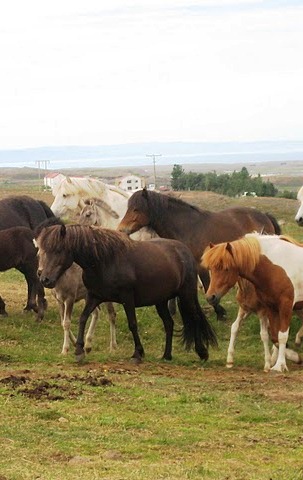Horses will help unlock immunological mysteries of allergies and herpes
For horses, Iceland is a safe haven from disease. Several pathogens never made it to the island, whose native horses evolved for almost 1,000 years in isolation. Without facing diseases common outside, such as equine herpesvirus type 1 (EHV-1) and insect-induced allergies (called sweet itch or summer eczema), Icelandic horses never had to develop immunity to them. But immunological ignorance comes at a price: When they leave the country, these internationally popular horses are unusually vulnerable.
Yet in a discrepancy that has long puzzled immunologists, expatriate Icelandic horses give birth to far hardier foals. Born outside Iceland, these foals are up to fifteen times less likely than their parents to develop allergies. In all breeds, foal and adult immune systems work very differently. Learning how and why could help prevent allergies earlier and enable better vaccines protecting foals from early-developing diseases like EHV-1.
Dr. Bettina Wagner, equine immunologist at the College of Veterinary Medicine, works with collaborators at Cornell and in Iceland to unravel the mystery of neonatal immune development with the help of Icelandic horses.
In February 2012, 15 pregnant mares traveled from their native Iceland to Cornell University, meticulously protected from exposure to several common pathogens. With the help of collaborators at the University of Iceland at the Institute for Experimental Pathology Keldur in Reykjavik, Dr. Wagner’s group receives regular samples from the mares’ first brood born in Iceland last Summer. Comparing foals in Iceland to their forthcoming U.S.-born siblings will reveal how separate factors (environmental and maternal) affect immune development.
Clinical collaborators at Cornell assisting with the project include Drs. Gillian Perkins and Dorothy Ainsworth. Dr. Klaus Osterrieder in Berlin, Germany will help in the study of EHV-1 while Dr. Mandi deMestre of the United Kingdom will collaborate on the immune regulations analysis. Cornell professor Dr. Hollis Erb will advise on the statistical analysis of the data.
“We want to know why foals born outside Iceland have better protection than those born in Iceland,” said Dr. Wagner. “It could be due to time of exposure, environment, or some combination of these, but the evidence points more to what the mother passes on.”
Dr. Wagner thinks that protective power may lie in a mare’s milk. Some mammals, including humans, start absorbing antibodies while in the uterus, but horses receive all immunities after birth. To absorb immune protection, newborn foals must quickly drink colostrum, which is packed with immune components.
Mares encountering new allergens may become hypersensitive to the antibodies their systems produce in response. But when they pass these antibodies on through milk, Dr. Wagner thinks that the foals’ budding immune systems may learn to use those same antibodies more constructively.
 Dr. Wagner’s group investigates specific antibodies called immunoglobulin-E (IgE), which can go astray in allergic diseases, reacting to harmless stimuli and causing inflammation. Building our understanding of early immune development in horses and humans could help doctors treat allergies and early-striking diseases in both species.
Dr. Wagner’s group investigates specific antibodies called immunoglobulin-E (IgE), which can go astray in allergic diseases, reacting to harmless stimuli and causing inflammation. Building our understanding of early immune development in horses and humans could help doctors treat allergies and early-striking diseases in both species.
“If we know how allergic diseases start early in life we can interfere before they develop,” said Dr. Wagner. “Horses are a valuable model for human allergies, for which regulatory mechanisms develop very early. It’s difficult to investigate human neonatal immunity, because most maternal immune transfer happens before birth. The horse system is more controllable, especially in Icelandic horses, and can reveal the separate effects of maternal transfer and environmental exposure.”
The study may improve protection from EHV-1, which often strikes before current vaccines designed for adult immune systems can protect foals.
“If we can learn how immune responses in foals differ from those in adults, we can use specific immune reactions that foals can mount early in life to develop better neonatal vaccines for earlier protection from a wide array of infectious diseases.”
This research is funded by the Harry M. Zweig Memorial Fund for Equine Research.
—
‘Scopes Magazine
February 2012
